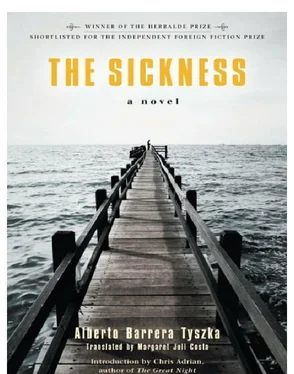The three drops form a little triangle on the floor. Mariana looks at them and then goes in search of more drops, until she finds a longer trail, a path.
“Javier!” she calls.
She goes along the corridor toward the room where the children are slaughtering small galactic monsters on the TV screen.
“Children!” she shouts. “Is Grandpa with you?”
She walks on, her head bent lower to the floor. She bumps into a small table. Something falls off.
“Javier! Children!”
Finally, ashen-faced, she reaches the room: the volume on the TV is deafening. Her children are alone. Without asking or saying anything, Mariana immediately turns and hurries to the bathroom, where she knocks twice on the door.
“Grandpa!” she says, still trying to appear calm.
No answer. She sighs, hesitates, looks at the floor. Another blood stain. She doesn’t knock this time, she grips the handle and pushes. The door won’t open. It bumps against the unconscious body of Javier Miranda. Mariana pushes harder, crying now and desperate. One of her children says something to her as he comes down the corridor.
“Don’t come near. Go away!”
The boy freezes. Mariana tries to slip a hand through the crack and push her father-in-law’s body out of the way.
“Phone your dad!” screams Mariana. “Phone your dad! Now!”
Andrés has turned off his cell phone and, still undecided, is once more standing outside Inés Pacheco’s apartment. Overwhelmed as he is by a sense of powerlessness, he feels that perhaps this is something he can do for his father: although he does not know her, this woman is his father’s other love, the one other experience of love that’s left to him. Why isn’t she with him now of all times? Why isn’t she there for him? Why will neither of them talk to him? Andrés thinks that perhaps this is a gift he could give his father: a visit from Inés Pacheco. But all he has is that vague presentiment. He rings the bell.
After a matter of moments, he again hears that shadowy whisper and then the door opens. It’s her. However, this time, when she sees him, she immediately tenses up. She looks uncomfortable and stares at him with a kind of impotent melancholy.
“Why have you come back?” she asks.
“Forgive me,” Andrés says, feeling nervous and awkward. “May I come in?”
“No,” says the woman, glancing behind her and leaning against the doorframe.
“It’s important.”
Andrés looks at her almost pleadingly. Her discomfort grows. But she says nothing.
“He’s very ill,” Andrés explains. “My father is dying.”
The woman takes in a great gulp of air, lowers her head, and when she raises it again, her eyes are bright with tears.
“Did you know?”
She doesn’t answer. She just gazes at him in utter desperation. Andrés doesn’t know how to contain his own anxiety. He wishes he could simply spirit her away. Then, just when she seems about to say something, a voice comes from inside.
“Inés.”
A tall, gray-haired man appears; he’s rather frail-looking, but has a pleasant, kindly face.
“Who is it?” he asks, joining them at the door.
“This young man is looking for. .” Inés stops, uncertain how to continue. “He’s looking for someone.” Then she, with a particularly emphatic gesture, explains: “This is my husband.”
The man remains at her side, studying Andrés with curious eyes. He smiles politely.
“Who are you looking for?”
“Oh, no one,” stammers Andrés. “I was given the wrong information. I’m so sorry. But thank you, thank you very much,” he says.
“That’s alright.”
The door closes almost noiselessly. The voices of the man and the woman linger on the other side. The man asks something. The woman answers. Then all is silence.
When Andrés turns on his cell phone again, all he hears is a howl. The ambulance siren is already opening up a wound of sound in the late afternoon.
Dear Ernesto,
How can I begin to explain everything that I have to explain to you now? Where to begin? I had better begin with my name: Karina Sánchez. I’m Dr. Andrés Miranda’s secretary. I don’t know if you remember me, we’ve met occasionally at the consulting room, and we’ve spoken on the phone as well. We only ever talked about appointments, as part of my work, nothing else. And yet, although you may not believe it, we know each other far better than that, we have had much closer dealings.
Let me explain: among the tasks Dr. Miranda assigned to me is that of dealing with any correspondence sent to his e-mail address, which he uses to receive social invitations, promotional material from pharmaceutical companies, and as a place to divert messages from certain patients, patients like you. Forgive my frankness, but when I decided to write to you this morning, I was determined to be completely honest with you, to tell you the whole truth, whatever the cost to myself.
Your first letter came to this address. I read it, told the doctor about it and he gave me instructions not to reply. When the second letter arrived, I said nothing. I assumed that the order he had given still held, no matter how many e-mails you sent. However, when I read your e-mail saying that you were following the doctor, I felt frightened. It seemed to me that things were getting serious, even dangerous. That was when, on the bad advice of a friend, I decided to reply to your letters myself.
Now in the midst of your surprise and indignation, you may find it hard to understand why I did that. I ask myself the same question all the time. At first, I thought it would be an innocent, amusing game, but gradually came to realize that I was wrong. You may not believe me, but I swear that it was you and what you said, the sincerity with which you wrote, that revealed to me the monstrous nature of what I was doing. I know my actions are unforgivable, because I now feel that what I did wasn’t just an error, it was a crime. I stole the doctor’s identity, I passed myself off as him, and, worst of all, I deceived you, I used and abused your privacy without your permission.
I can assure you that I will quite understand if, from now on, you hate and despise me. It will be painful to me, but I know that you would be absolutely within your rights to do so and I will try to accept it. I have no excuses.
I must confess one other thing. You changed my life, Señor Durán. I now understand perfectly what you feel, I know what it is to feel as you do, to experience those same symptoms. In some way you infected me. You and your words. And so, when you stopped writing, I began to grow anxious, to feel worse and worse. I’m not saying this to flatter you or to excuse my errors. I’m saying it because it’s true.
In the hope that this finds you well and that you will, one day, feel able to forgive me, I remain,
Yours sincerely,
Karina Sánchez
He’s in room 508. The emergency room treated him and cleaned him up, but decided there was no point in sending him to intensive care. There wasn’t much more they could do. He was weak and in terrible pain. They’ve put him on a saline drip. They’re keeping an eye on his blood pressure and his pulse. He’s been given morphine.
Mariana is outside in the corridor with the kids. Andrés has just arrived. He goes over to the bed and looks at his father. He’s rapidly becoming just a bony structure, as if his skin were also slowly bidding farewell and clinging to the bone; as if the clear outline of the skeleton were rising to the surface. Andrés bends over and kisses him on the forehead. His father opens his eyes. They look at each other and exchange sadly knowing smiles: there’s no need for any fuss, they both know perfectly well what’s happening.
Читать дальше












